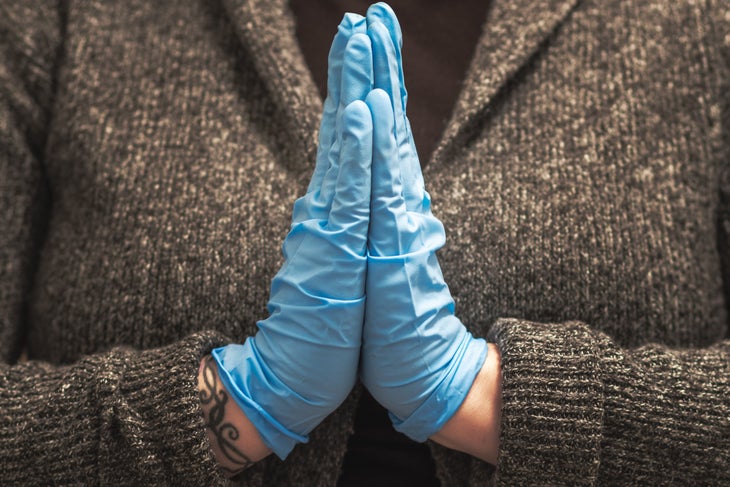Heading out the door? Read this article on the new Outside+ app available now on iOS devices for members! Download the app.
When Georgia Gov. Brian Kemp announced that the state’s economy would begin reopening as of April 24, the move was met with resistance from concerned mayors and small business owners who feared that the coronavirus threat was far from over. Among them, several Atlanta-area yoga studio owners who say it’s still too soon to resume their business as usual.

The governor was among the first in the United States to begin lifting stay-at-home restrictions during the COVID-19 pandemic, granting bowling alleys, body art parlors, hair and nail salons, yoga studios and fitness centers, and, as of April 27, theaters and restaurants, to reopen, but still adhere to social distancing guidelines. Over a dozen more states had followed suit as of press time (Colorado, Texas, Mississippi, Tennessee, Ohio, Vermont, and more), unveiling plans to reopen by the first week of May even as the global infection rate reached 3 million.
See also Stressed About Coronavirus? Here’s How Yoga Can Help
Robert Redfield, MD, the director for the Centers for Disease Control and Prevention (CDC), has suggested that 19 to 20 low-impacted states could be ready to reopen by May 1. But other public health experts have warned against reopening the economy amidst the pandemic, particularly in Georgia, where only 1 percent of residents have been tested.
For yoga teachers and wellness professionals, whose job it is to ensure the well-being of their clients, the ongoing uncertainty of the virus poses an obvious health risk to their students and staff. The unsettling irony of reopening some of these small businesses is that many require people to be in close contact. With six-feet-apart social distancing guidelines still in effect, how is anyone supposed to get a haircut or sit down to dinner at a restaurant or receive a hands-on adjustment from a yoga teacher safely?
In Atlanta, several yoga studio owners have been speaking out on a group Facebook page about why they’re not reopening, despite the that fact that some have seen a an 75 percent decrease in sales since closing in mid-March. I spoke with a few of them to learn more about their decisions and what that means for their communities.
See also Why Healthcare Professionals Need Yoga Now More Than Ever

Atlanta Yoga Teachers Speak Out
Neda Honarvar, 38, owner of Tough Love Yoga in Atlanta’s Candler Park, says that after 10 years of operation, she doesn’t want to lose her business given everything she’s worked for, but she’s not willing to prioritize profits over people. “There’s no evidence that it’s safe to reopen at this point,” she said. “There’s just no accurate reporting of the spreading of this disease, and I’m not willing to reopen and put our staff and students at risk and contribute to the continuing spread of the virus.” On a recent trip to the grocery store during the first weekend of Atlanta’s reopening, Honarvar said she watched as hordes of people were spilling out of restaurants and drinking beer, making close contact without wearing masks as if everything were back to normal. “It’s really shocking and concerning,” she says. “More people are going to get sick.”
See also Save Your Local Yoga Studio
Honarvar says she thinks Gov. Kemp reopened small businesses to lower the state’s unemployment rate. “He’s willing to put our lives on the line for money,” she said. Like many studios around the country, Honarvar has migrated to online classes hosted on Zoom and Namastream and is operating at a loss. She has forgone her own paycheck to continue to pay her full-time teachers who rely on teaching to pay their bills, while her part-time teachers have opted out of paychecks. Yet she knows that the current trajectory, despite the extra revenue coming in from online teacher trainings as well as generous donations from the community, isn’t sustainable in the long term. Honarvar says she doesn’t anticipate reopening Tough Love any time before July—and that she wants a green light from the CDC to be able to do so comfortably. “I need access to cleaning supplies so I can disinfect between classes,” she says. “But right now I can’t even buy disinfectant spray anywhere.”
In response to reopening her four-year-old business, Octavia Raheem, co-owner of Sacred Chill West, put it simply on Instagram: “Nah.” Raheem says she needs to see a decline in hospitalizations and deaths for 14 days before she considers opening the studio again. “You can revive an economy but you can’t revive a dead body,” she said. “We listen to health experts and scientists, not politicians.” Sacred Chill has been offering pre-recorded classes online since temporarily closing in March. She says the studio is losing revenue from a decline in memberships, as well as participation in immersions and trainings. But the rent is still due. “In this moment we are fine even though we are struggling, but three more months of this and I can’t tell you what would happen after that,” she says.
Despite gaining new practitioners from different parts of the country, Raheem says that without multiple in-person classes, trainings, and regular privates, the studio’s revenue is down 75 percent. She and her business partner, Meryl Arnette, will soon run out of their savings. They applied for multiple government grants—a dozen of them, including one through the Paycheck Protection Program (PPP)—and received only $2,000 from a Economic Injury Disaster Loan (EIDL), which hardly covers their business expenses let alone pays their employees.
Cracks in the Business of Yoga
Raheem says the pandemic is revealing the cracks not just in government systems, but in the business of yoga. “I love my community and studio, but at this moment the studio is a liability because all the bills are still due and it’s not in a position to generate any revenue.” (Raheem, meanwhile, is among the countless others who have not received a coronavirus stimulus payment.) She hopes that by the summer she’ll be able to partially reopen, capping classes at eight people (the studio can hold 30) and encouraging everyone to wear masks and ensuring that staff members do temperature checks. “Things will not look any way like they did before,” she says. “When is anyone going to feel comfortable in a room at capacity—breathing and sweating and sharing props?”
Tiffany Johnson, 35, a teacher and student at Sacred Chill West, agrees. “I believe the potential harm that can be done at this point is still too high—for practitioners, teachers, and anyone we come in contact with,” Johnson says. “I’m keeping in mind the recommendations of leading public health experts and officials—we put lives at risk by going to a public class.”
See also To Pay or Not to Pay for Yoga During the Coronavirus Shutdown
Tracy Jennings-Hill, owner of LiveURyoga in Roswell, GA, has been conducting a virtual 500-hour teacher training since March 17, in addition to offering studio live streams on Zoom. As a YogaFit trainer, she says the pivot toward digital is an opportunity for the industry to shift outside of the norm. She’s added family yoga and kids’ yoga to her schedule to meet a new demand from her clients, but without new students walking in through the doors she’s lost about 50 percent of her monthly revenue. Despite those losses, however, LiveURyoga will remain closed. And the decision to do so, she says, was well-received by her community. “I think he’s (Gov. Kemp) being socially irresponsible; the places he says to reopen—fitness, massage, nail salons —all have to do with you being in somebody’s face,” she said. “It makes no sense whatsoever.” When the time does come to reopen, Jennings-Hill says that LiveURyoga, which can hold 40 bodies in its space, will admit just five students per class and will continue to offer virtual classes. “I think it has to be a step-by-step slow re entry,” she said.
Mandy Roberts, owner of FORM Yoga in Decatur, GA, says she closed her studio to the public well ahead of the stay-at-home mandates. The studio’s pre-existing library of pre-recorded classes as well as regular Facebook Lives has kept the community connected during the closure. Roberts has also established a “Seva Scholarship Fund” to provide free classes for those in financial straits. Still, shutting down the studio meant an immediate 70 percent loss in revenue, even with continued financial support from the community. “We already had a very low profit margin so this change was quite debilitating,” she told me in an email. “But it’s the right thing to do.”
Roberts said it’s “mind boggling” to try to wrap her head around how social distancing could actually work for many of the businesses slated to reopen. “We are now learning that the governor is likely making these choices to cut the amount being paid out to unemployment claims,” she said. “Our government ‘leadership’ is placing more value on the economy over the safety and wellbeing of humanity.”
See also This Yoga Sequence Will Reduce Stress and Boost Immunity
For yoga studios in Georgia, across the U.S., and beyond, no one—from students to teachers to studio owners—really knows what the future of the industry will hold. But for studio owners like Roberts and others, they will remain closed until it is safe and morally responsible to reopen—and will do everything in their power to keep the communities they’ve built alive and well for the long haul.
“Some studios will make it, some will not,” says Sheila Ewers, owner of Johns Creek Yoga and Duluth Yoga. “When we emerge from seclusion, we will likely find a community whose financial resources are depleted, whose home practices have strengthened, and who may not need our skills in the same way that they once did.” Ewers, whose studios have been in business since 2012 and 2018 and are operating at a 50 percent loss, says she’s hopeful that the yoga industry will continue to adapt and innovate—which may also mean letting go of the way things used to be.